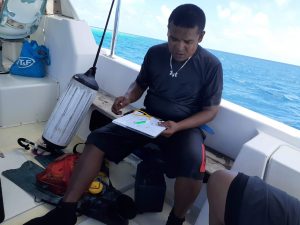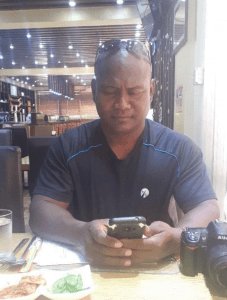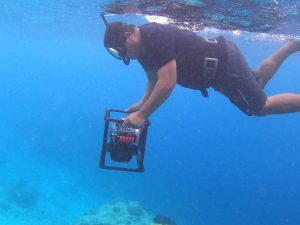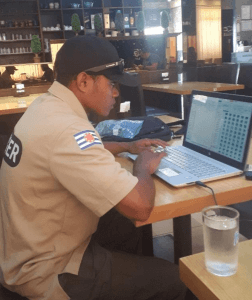Summary
Since 2018, OneReef (in addition to other organizations) has partnered with Ngarchelong State Conservation and Law Enforcement (NSCLE) in the Republic of Palau to implement their marine management plan. Their objective is to achieve a healthy, resilient reef system that is part of their cultural identity and helps achieve food security as well as increased tourism revenue for the community.
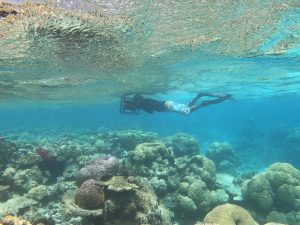
In March 2020, OneReef worked with Ngarchelong State Conservation and Law Enforcement to pilot 3D imaging of reefs in 6 different sites by local teams. This was the first time a local island team imaged their reefs independently since the OneReef facilitated training in 2019 with scientists from Scripps Institute of Oceanography (SIO). Putting imaging technology in the hands of island conservationists is transformational and has significant implications for ongoing effective reef management. This includes continued investment in development of local teams, supplementing rich reef image data with fish counts, as well as reduced scientists’ time and costs, allowing for SIO and OneReef to monitor more reef areas.
For conservation that endures, it’s vital to support initiatives like these that directly partner with the people on the ground who are committed to protecting their natural environment. Island communities have the traditional knowledge, ability and desire to sustainably manage their resources. However, modern technical and financial resources and tools are often necessary to do this effectively today in the face of climate change, overfishing, and pollution challenges.
It is important that we secure commitment, agree on the outcomes and obtain the resources needed for ongoing reef monitoring in island communities to help improve reef health and food security through well supported, effective local stewardship.
Can we have it all – food security, tourism, and healthy reef systems?
The states of Ngarchelong and Kayangel co-manage one of the largest coral reef systems in Palau, commonly known as the Northern Reefs. In the last two decades, both states have seen drastic declines in their coral reefs and nearshore fisheries due to (1) coral bleaching as a result of ocean warming, (2) overfishing by local fishermen for subsistence and supplemental income, and (3) pressure from the tourism market. Despite management efforts over two decades, reef health and marine resources continue to decline. Funding remains limited due to a decrease in tourism revenues and an increase in the number of sites within the Palau Protected Areas Network (PAN) that share tourism revenues.
Since 2018, OneReef has (1) implemented a weekly mentoring program to improve leadership and team effectiveness, (2) provided support in pilot testing a Marine Monitoring (M2) Radar to increase their surveillance effectiveness, (3) introduced cutting edge underwater imaging technology for long term reef management. All of these initiatives support the community’s desire to have a healthy, resilient reef system which is part of their cultural identity. A healthy reef system can also help achieve food security and increased tourism revenue for the community.
Local expertise and autonomy allows for scaling conservation efforts
The Underwater imaging pilot relied on the Ngarchelong team to develop expertise in Scripps Institute of Oceanography’s 3D reef imaging technology. The team will also take charge of communicating observed changes and rich data to the community for improved decision making around reef health as well as for tourism marketing. The Northern Reef is a very large and complex reef system that has huge potential for the state’s tourism industry and for the community’s food security.
The partnership between OneReef and the Ngarchelong Leadership Team has been instrumental in initiating the
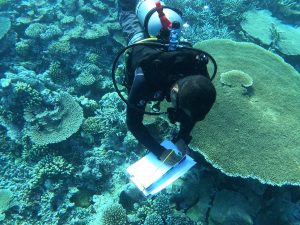
development of local expertise in underwater imaging, building strong engagement with community partners, and securing commitment for ongoing reef monitoring. Importantly, Ngarchelong can be a successful model site that other communities can look to for support and inspiration for their conservation efforts, helping us scale our conservation efforts faster in Micronesia.
The success of this project will be incumbent upon appointment of local leadership of the reef imaging project, ongoing training, and supplementing imaging data with fish count surveys so that the local community can accomplish its conservation goal of improving overall reef health and can also ensure food security.
Healthy Systems co-existing for the long term!
We are really excited about these outcomes and the possibility of healthy reef systems stewarded by local communities equipped with the right resources. We would love to enlist your support in raising funds for the Ngarchelong community to finance reef imaging of 30 additional sites and follow-up imaging of the 6 sites from the pilot program. Please visit our Project Page on GlobalGiving to support the conservation efforts of the remarkable Ngarchelong community. Write to us if you would like to review the detailed reports and future plans.
-Author: Wayne Andrew
